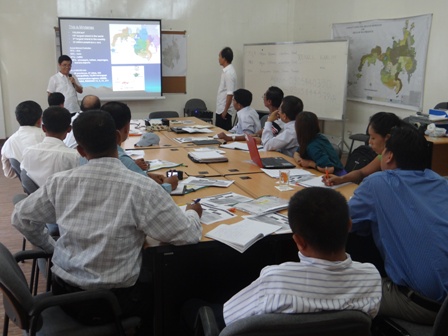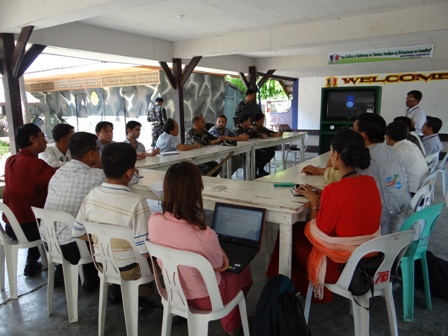Civilian Monitors from Mon State, Myanmar, Learn Lessons about Civilian Ceasefire Monitoring in Mindanao, Philippines
By Ashish Pandey, Field Associate
15 June 2015
 Nonviolent Peaceforce (NP) in Myanmar facilitated a week-long exposure visit to Mindanao in the last week of May with representatives of the civilian ceasefire monitoring network in Mon State. The network was established by the Shalom Foundation, with the support of NP, in 2014. The objective of the visit was to learn from the experiences of the civilian ceasefire monitoring network in Mindanao; so that the monitors in Mon State can further strengthen their own network.
Nonviolent Peaceforce (NP) in Myanmar facilitated a week-long exposure visit to Mindanao in the last week of May with representatives of the civilian ceasefire monitoring network in Mon State. The network was established by the Shalom Foundation, with the support of NP, in 2014. The objective of the visit was to learn from the experiences of the civilian ceasefire monitoring network in Mindanao; so that the monitors in Mon State can further strengthen their own network.
Min Aung Htoo, the Secretary of the Mon Civilian Ceasefire Mechanism (network), explained "Mon State, like Mindanao, has been affected by conflict for decades. A peace process is underway in Mindanao and local CSOs (civil society organizations) have contributed in ceasefire monitoring, thus complementing the formal ceasefire network. Therefore, with this visit, the participants want to learn from the Mindanao experience and see if any of this learning could be implemented in Mon State."
Currently, the government in Myanmar is negotiating a nationwide ceasefire deal with many ethnic armed groups with the aim of bringing an end to the decades-long conflict that has left thousands dead and millions displaced. In contrast, the peace process in Mindanao has matured through the years with the engagement of the key actors and civilians alike.
The monitoring network in Mon state, though, is not yet a component of any formal mechanism. Currently, it is developing as a loose network with the purpose of monitoring both civilian protection issues in the state and the adherence of the key parties to the bilateral ceasefire agreement that was signed by the government of Myanmar and the New Mon State Party in 2012.
During the exposure visit, the monitors engaged with a wide range of stakeholders, including: representatives of the Government of the Philippines, Moro Islamic Liberation Front Coordinating Committee for the Cessation of Hostilities, Armed Forces of the Philippines, the International Monitoring Team, Local Monitoring Teams, and local civil society organizations.
The stakeholders were unified in their advice. They stressed that, although it may be difficult in the early stages, monitors need to build relationships with members of all sides of the conflict to strengthen support for later monitoring work they undertake. The monitors should be working in a transparent manner and should ensure the integrity of the network. This can be achieved by engaging both sides to mitigate any security risks. Additionally, early stage monitors can work to ensure inclusivity so that all people have a sense of ownership over the process.
"It was heartening to see the monitors from Mon State actively engaging with the stakeholders they met and asking some very considered questions. In return, the stakeholders gave valuable advice to the Mon State monitors on how to engage their stakeholders. I am confident that the monitors in Mon State have achieved a lot and that they will be able to put relevant aspects into practice in their own context" said Mel Walker, field associate with NP in Myanmar, who accompanied the monitors.
Ashish Pandey, another field associate with NP Myanmar who had previously worked with NP in the Philippines, compared the situations in the two countries: "Though the context in Mindanao and Myanmar is obviously very different, there are a lot of similarities too. Years back in Mindanao, the context was not very different than it is now in Myanmar. The Armed Forces of the Philippines were not very receptive to the civilians and there was a big gulf of distrust between the government and the MILF. Despite the fact that the parties have signed the Comprehensive Peace Agreement, evidence that the peace process has come a long way, the process still remains volatile given the uncertainty surrounding the Bangsamoro Basic Law which creates anxiety among the communities. Also, the current uncertainty around the signing of a comprehensive Nationwide Ceasefire Agreement in Myanmar is creating similar anxieties in communities, including the ones in Mon State. Hence, this exposure trip was of great importance for the Mon monitors to learn from Mindanao’s experience."
Stressing the importance of the visit, one of the monitors concluded: “I really learned a lot on the trip and I’m very impressed with what Nonviolent Peaceforce has been doing in Mindanao. We want to go back to our homeland now and analyse our learnings to identify and apply the lessons appropriate to our context in order to increase the participation of our people in our peace process.”
The exposure trip was jointly organised by NP in the Philippines and NP in Myanmar, along with a local Myanmar partner, the Shalom Foundation. It was made possible by the generous support of the European Union.

